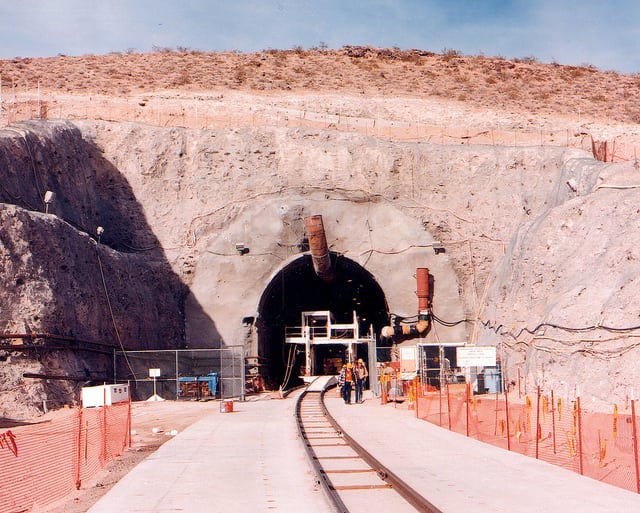
The U.S. Nuclear Regulatory Commission (NRC) needs more funding in fiscal 2019 for licensing Yucca Mountain in Nevada as a nuclear waste repository, mostly to put more full-time people on the project, the independent nuclear-waste regulator said in its budget request this week.
In a roughly $970-million request for the budget year starting Oct. 1, the NRC seeks almost $48 million for Yucca Mountain. That is nearly 60 percent more than it requested last year to prepare for the possibly years-long, quasi-judicial review of the Department of Energy’s planned application to license the Nye County, Nev., site for permanent disposal of tens of thousands of tons of spent nuclear reactor fuel and high-level radioactive waste.
The 2019 request would put 124 full-time workers on the job supporting Yucca licensing activities, the NRC said in a detailed budget justification unveiled Monday. The 2018 budget request sought $30 million for Yucca Mountain and 71 full-time equivalent positions, but the NRC has yet to receive any of that nearly five months into the fiscal year.
Like the rest of the federal government, the NRC’s budget is frozen at prior-year levels under the fifth continuing resolution of fiscal 2018. The 2017 budget included no funding for Yucca, leaving the NRC with a dwindling carryover dating to the Obama administration to advance the Yucca licensing proceeding. Likewise, the Department of Energy has not received the $110 million it requested for 2018 to prepare for the legal rigors of the licensing process.
Broadly, the 2019 NRC request would, if approved by Congress, pay for licensing proceedings for construction of the repository; preparations for federal lawsuits; facilities and information-technology infrastructure operations; rule-makings; and support work such as procurement, recruitment, and staffing, according to the budget justification.
Currently, there is just under $515,000 left in the NRC’s Nuclear Waste Fund balance to pay for Yucca-related work. It had more than $13 million in 2013, when a federal judge ordered the agency to resume licensing proceedings. The NRC spent much of the balance since then on a safety report about the project; loading Yucca-related documents into the commission’s online data library; and preparing a supplement to the project environmental impact statement.
The NRC is now focused on rebuilding its Licensing Support Network, which held close to 3.7 million documents related to the Yucca Mountain adjudication before the Barack Obama administration suspended DOE’s license application in 2010. Many said that move was a political favor to then-Sen. Harry Reid (D-Nev.): the powerful former Democratic leader whose home state opposes Yucca.
If DOE resumes the application as the Donald Trump administration wishes, the NRC would be in charge of deciding whether the agency gets the license. Whether DOE can afford the resumption in fiscal 2019 depends on if Congress approves the $110 million the agency again requested for that purpose, plus another $10 million to advance interim storage of spent fuel until the permanent repository is ready. Last year, Congress did not, and circumstances on the Hill have not changed much.
Before budget negotiations collapsed last year and forced government agencies besides the Pentagon to subsist on stopgap spending measures, the House approved every dime of the administration requested for Yucca. Senate appropriators, on the other hand, proposed a 2018 energy budget with no money for the project.
Widely reported Capitol Hill gossip holds that Senate Majority Leader Mitch McConnell (R-Ky.) would not permit Yucca funding to come to a vote in the Senate while Sen. Dean Heller (R-Nev.) — who opposes the project — is up for re-election. A vote might put Heller in the politically difficult position of holding up the whole federal budget to stop Yucca.
“Under my leadership Congress has not appropriated funding for licensing activities at Yucca Mountain as requested in the last budget, and I’m going to continue to fight to make sure that this project doesn’t see the light of day,” Heller wrote Monday in a statement on his website.
Energy Secretary Rick Perry, in a budget briefing with the press Monday, said DOE and the NRC need the requested Yucca funding to “address the legal issues on licensing,” and that the United States has “a legal and a moral responsibility” to deal with spent nuclear fuel piling up at U.S. power plants.
Congress in 1982 directed the Energy Department to by Jan. 31, 1998, begin accepting spent fuel and high-level waste for disposal. It was widely noted last month that the 20-year anniversary of that date came and went without DOE fulfilling its obligation.
Yucca, if completed, could hold at least 70,000 metric tons of spent fuel. That is roughly the amount of spent fuel now stored on-site at power plants across the country.
The DOE funding request for Yucca Mountain work “provides for a program office to provide policy direction and perform functions necessary to support the licensing process,” according to the agency’s Budget in Brief. “This request provides for legal support to represent the Department in the licensing process, as well as to respond to litigation and other legal matters. It provides for technical and scientific support necessary to support an affirmative case for the license and to respond to any challenges to the license application. It also provides for the
document management activities associated with the licensing process.”